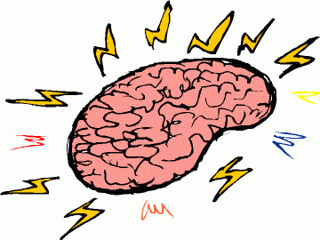( gawen947 / flikr )
The moon’s dim glow is the only light that shines your path. Relaxed and enjoying your late night stroll, you spot what appears to be a snake just a few meters ahead. You begin to tremble in fear, a bead of sweat drips down your temple and you Usain-Bolt-it in the opposite direction, finding another way home.
The morning comes and you walk down the same path. You notice it and with a smirk, under your breath you mumble, “It was just a rope.”
This Buddhist parable has been around for centuries and for good reason; it’s a simple illustration of how our entire reality is created from our thoughts and perceptions.
Yes, there could have been a snake on your path rather than a rope, which would be good reason to be concerned or apprehensive, but the fact remains that it wasn’t a snake. The only thing that created the “snake” was your thinking. Nothing physical, nothing real, nothing else but your thinking.
Every second of every minute, of every day, we are the only one’s creating our world around us. Every emotion and every experience we’ve ever had has been through our thoughts, nothing else. Whether it’s happiness, anger, sadness, depression, anxiety, insecurities, or anything else, it’s all due to our thinking and perceptions.
An easy demonstration of this can be done as you sit and read this.
Pause and think about something hilarious.
( Pinterest Humor / flikr )
What emotions are you feeling? Are you feeling angry? Sad? Or are you feeling a sense of happiness? Some joy?
Now, think of something that makes you really angry or upset.
( Kathy Nobels / flikr )
What sort of emotions do you feel now?
It’s impossible for the body to feel anger when thinking of a happy experience. You only begin to feel anger when you start thinking about that thing that makes you or made you angry.
Simply put; emotion is thought.
To resume our little test, it’s important to ask yourself what’s changed in the moments between your positive and negative emotions? You’re sitting in the same spot with everything around you and everything in your life being the exact same as it was in the previous moment. The only thing that’s changed is your thinking which has created your perception of that moment, in that moment.
It’s easy to look at these examples and misconstrue their lessons to be about positive thinking, but that would be a mistake. The main principles of the examples, a long with the parable is: thought creates your experience but also, don’t always believe what you think.
On average, the human brain thinks around 70 thousand thoughts a day and with that, they aren’t all going to be rosy ones. Some will be filled with tons of negativity, it’s just who and what we are. Throughout evolution and for all sorts of reasons, survival being number one, the brain has developed instincts and certain responses to different situations. That, coupled with our ego’s can, in a way, trick us…
You call your best friend and they don’t answer. Days go by and you don’t get a response. You might begin to feel irritated or even anger towards your friend because your perception may be that they’re ignoring you. It stirs in your mind and you get increasingly annoyed each day they don’t call back. Then, later in the week you find out they’re dealing with a family matter so they weren’t able to speak to anyone the past few days. If you’re their true friend, all of that negative emotion will automatically switch to compassion, sympathy and maybe even a little guilt for getting angry with them in your mind. The only thing that’s different now is what your thinking.
( crumpledpaperbirds / flikr )
Our mind can play the same type of tricks on us that can lead to depression, anxiety, pressures, insecurities, etc.
We feel these negative emotions when we do one of two things; we’re either replaying the past with regret or we’re trying to predict the future.
When we get caught up thinking and churning about the past, wishing it were different, that’ll lead down to depressing thoughts, making you feel depressed. It doesn’t matter how much we think about it, the past cannot and will not change.
If we get caught up worrying about a future event, that leads to anxious and stressfull thoughts, leading to feelings of anxiety and stress. We can’t foresee the future, it’s completely unpredictable and if we really think about it, the future doesn’t even exist yet, only in your head it does.
So, if living in the past can cause depression and living in the future causes anxiety, where does that leave us to live?
In the moment.
Now, “living in the moment” can be a term that gets thrown around like a hot potato with flaming spikes on it but, do we really understand what it means?
Living in the moment is simply a way of thinking…or non-thinking.
When you listen to your favourite song and you can feel it in your bones while your groovin’ and movin’ to the beat, do you feel like your thinking?
When you’re watching a great movie and you feel completely engulfed in it, almost forgetting that you’re sitting down, do you feel yourself thinking?
If you’re an athlete, when you’re “in the zone” and just reacting to the play, do you feel yourself thinking?
In all these instances, we’re living in the moment. We don’t feel like we’re thinking, but we are.
( Pin Zou / flikr )
Our brain’s only job is to think, it can’t and won’t do anything else. So, if we just get out if it’s way and ignore our negative thoughts of worries, stresses, anxieties and so on, we can let it work naturally. This isn’t easy but with the awareness of knowing that our thinking in the moment is what’s creating our experience, along with understanding that thoughts can trick us so we don’t take each one so seriously, we can begin noticing a shift in our thinking and and increase in our peacefullness. It doesn’t take much effort, it’s just awareness and consistency because it’ll benefit us in every way imaginable; our physical and mental health, our production and efficiency, what we value and the list goes on and on.
And living in the moment sometimes gets confused with only worrying about the now and not caring about the future.
This couldn’t be farther from the truth.
Living in the moment will only prepare you better for the future because you’re using your intuition and creativity, all while in a calm state of mind. This is always when we make our best decisions because the mind isn’t clouded with obstructive thoughts about the past or future. It’s here and it’s doing what’s best for you in that moment.
As shown above, we live in the moment all the time, but we just don’t realize it. Being completely present has us ignore all our negative thinking and simply be present in the now. Our brain processes the information how we need it, in that moment, without any judgements, preconceptions, or anything else that could hinder our thinking.
Take the snake and the rope example. If the person was living in the moment and not wrapped up in his “fear-thoughts” of the snake, he may have been able to approach closer, realize it’s not a snake and continue on his way home. On the flip side, even if it was a snake, if they were in a relaxed, calm state of mind, he would realize it’s a snake as he got closer, still avoiding danger.
If we “live in the moment” many times throughout our day, almost by accident and without noticing it, how do we actively access it?
There’s two simple, but profound ways to achieve this.
( Thailand-Traveler.com / flikr )
The first is to actively listen. Listen to your surroundings, whatever that may be. Whether it’s the birds and the bees, the radiator, the rain hitting the window or the buzz of traffic, just listen to it. Listen to them without any judgements or try not to label the sounds. As the great Zen philosopher, Allan Watts, once said, “Just listen to the noises as if they were all a part of the soundtrack of life.” By actively listening, our mind has no choice but to be brought back to the moment. We can’t listen to the past or listen to the future, we can only listen to the here and now.
The second and most important thing to do to get into and stay in the moment is to not think. Yes, don’t think. Sounds strange but your brain will do it for you, just get out of the way and let it work. A way to do this is to simply “recognize” that you’re thinking. This means when you begin to feel caught up in thoughts, tell yourself that you’re thinking too much. Literally tell yourself “I’m thinking right now, I don’t need to think.” I know it sounds a little crazy, but it really works!
The way all this has been put here may come across as: “If thoughts are emotion then just think happy thoughts and everything will be gravy”, but that would be untrue.
Not only have we been thinking this way our entire lives, these thoughts can seem so real and we can’t help but attach ourselevs to a lot them.
But, with the awareness of knowing that we create our emotions with our thoughts and now that we know our thinking can trick us, we can begin to find peace more often. It’s not easy but it can be done with daily and constant practice, leading to increased time in the moment, rather than in the past or future. This will not only increase our happiness and decrease depression, anxiety and so on, it’ll also keep us at peak performance by being in a calm state while using our natural intuition and creativity, not clouded by our poor thinking.
“Thought becomes perception, perception becomes reality. Alter your thoughts, alter your reality.” – William James







